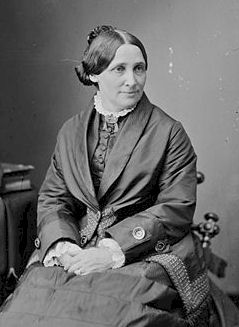|
 |

Part of the American
History & Genealogy Project |
Lucy Webb Hayes 1831 ~ 1889


Lucy Webb Hayes
Lucy Webb Hayes was born in Chillicothe, when it was the capital
of Ohio. She was the daughter of Dr. James Webb and the
granddaughter of Dr. Isaac Cook. The Webbs were natives of North
Carolina. Her father died of cholera in 1833, in Lexington,
Kentucky, where he had gone to complete the arrangements for
sending slaves, whom his father and himself had set free, to
Liberia. After the death of her father her mother removed to
Delaware, Ohio, in order to be near the Western University,
where her sons were educated. Mrs. Hayes pursued her studies and
recited with her brothers to the college instructors, by whom
she was prepared for the Western Female College at Cincinnati,
entering that institution at the same time that her brothers
entered the medical college.
Mrs. Hayes was very fortunate in having a home in Ohio, which
was among the first states to advocate the equal education of
men and women. She was a great favorite of Rev. and Mrs. T. B.
Wilbur, the principals of the college. She was a devout member
of the Methodist Episcopal Church, following in that respect
closely in the footsteps of her mother. It was while she was a
student that she met Rutherford B. Hayes. They were married
December 20, 1852. Mrs. Hayes' chief characteristics were her
womanly and wifely qualities and devotion to her religion.
Rutherford B. Hayes was a graduate of Kenyon College and of the
Cambridge Law School. He practiced law before the Supreme Court
of Ohio and established himself at Fremont, Ohio, but
subsequently removed to Cincinnati, where he remained for many
years. He was made city attorney twice. At the outbreak of the
Civil War he volunteered in the 23rd Ohio Regiment (Infantry)
and was subsequently made major of the regiment of which General
Rosecrans was colonel and the late Stanley Matthews was the
lieutenant-colonel. They were assigned to the army of the
Potomac. He was four times wounded and served to the close of
the war notwithstanding the fact that he was urged to enter
politics. Mrs. Hayes spent two summers and a winter taking care
of her husband and his soldiers in the field. After his return
from the service he was twice elected to Congress, after which
he was made Governor of Ohio and they occupied the executive
mansion at Columbus.
Mrs. Hayes made a national reputation by her pre-eminently
social qualities while occupying the executive mansion at
Columbus. She seemed to feel that a state or national executive
mansion belonged to the people of the state and the nation and
she threw open the doors of the executive mansions in Columbus
and Washington on all occasions that it was proper that she
should extend their hospitality to the people, or to
distinguished visitors from other lands. She worked with
earnestness as the wife of the Governor in the interest of the
charities of the state, and was one of the most popular women of
her day. Mrs. Hayes was probably one of the most highly
intellectual and accomplished of the women who have ever graced
the White House and was at the same time the most cordial,
unaffected and genial. She had been the idol of the soldiers
during the war, as well as of the people of Ohio, and when she
came to Washington there was great solicitude as to whether she
was worthy of her universal popularity, and people waited with
impatience for her first reception. Those who attended that
reception went away enthusiastic in their praises of her. While
she could not be called a beautiful woman, she had a most
attractive face, very bright and expressive eyes and beautiful
black hair. She had wonderful health and would not admit that
she experienced any fatigue, although she gave more receptions
and social entertainments than any occupant of the White House.
There were very many illustrious men in this country when
President and Mrs. Hayes were in the White House, and it was her
pleasure to make everyone feel at home, and few who called to
pay their respects failed to go away without singing her
praises. The poorest person who sought alms at the White House
was not denied some recognition. She was passionately fond of
flowers and there was a profusion of flowers in the White House
on every occasion. She created a sensation when she decided not
to serve wine on the President's table during their residence in
the White House. The adverse criticisms made no impression
whatever upon her. She would not discuss the subject, but
persisted in her decision, and many time since persons have
wished that her example might have been followed by her
successors.
She was very much interested in the missionary cause, and there
is in Washington the Lucy Webb Hayes Home for Deaconesses and
retired missionaries, which was named in her honor. A life-sized
portrait of Mrs. Hayes by Huntington, was placed in the White
House by the Temperance Women of this country. No passing of a
Mistress of the White House was more sincerely regretted than
was that of Mrs. Hayes, and no one has been more sincerely
missed since her untimely death at Fremont, Ohio, in 1889.
Women of
America

Source: The Part Taken by Women in
American History, By Mrs. John A. Logan, Published by The Perry-Nalle
Publishing Company, Wilmington, Delaware, 1912.
|